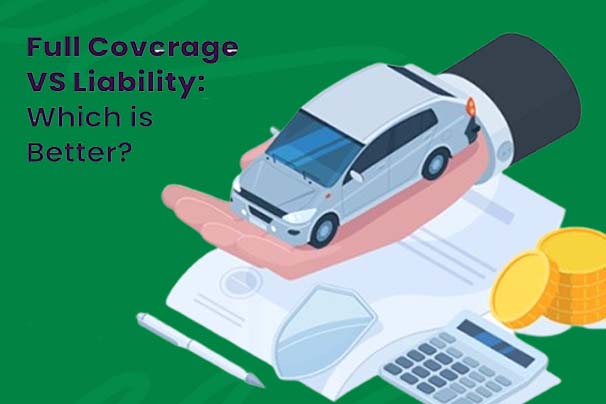Liability vs. Full-Coverage Car Insurance: Which Is Better? When exploring new car insurance options, you may encounter terms like “liability car insurance” and “full coverage car insurance.” While these terms are likely familiar, understanding the precise distinctions between them can be challenging.

You’re not alone in this experience. Many drivers find the process of shopping for car insurance to be perplexing, often due to the abundance of industry jargon. To clarify these terms and provide you with essential insights to empower you to select the most suitable car insurance policy tailored to meet your requirements.
Liability
Liability auto insurance is specifically crafted to provide financial protection in situations where you are deemed responsible for an accident resulting in bodily harm or property damage to others. This type of insurance serves as a safeguard against the financial repercussions that may arise from such incidents. This ensures that the affected parties receive the necessary compensation for their injuries or property losses.
By securing liability car insurance, individuals can mitigate the potential financial burden associated with accidents they cause. Thereby offering a layer of security and peace of mind knowing that they have coverage in place to address the costs incurred by others due to their actions on the road. This form of insurance is essential for drivers to fulfill their financial responsibilities and protect themselves from significant financial liabilities in the event of unforeseen accidents.
What does Liability Car Insurance Cover?
Bodily Injury Liability Coverage:
This aspect of liability insurance steps in when you are responsible for an accident that leads to injuries, covering medical expenses, loss of income, legal fees in case of a lawsuit, and compensation for pain and suffering.
Property Damage Liability Coverage:
This component addresses costs associated with repairing or replacing damaged property. Such as vehicles or structures, resulting from an accident you caused. It also extends to covering legal defense expenses if legal action is taken against you.
What Does Liability Car Insurance Cover?
Auto insurance providers establish specific limits for each type of liability coverage. Bodily injury limits are typically defined on a per-person and per-accident basis. If the costs stemming from an accident surpass these limits, you will be accountable for the excess amount.
Your liability car insurance policy does not extend coverage to:
- Personal injury to you or passengers in your vehicle.
- Repairs to your own vehicle following an accident for which you are at fault.
- Damages caused by uninsured or underinsured drivers.
- Claims exceeding your insurance liability limit.
Pricing Information:
The cost of liability car insurance is influenced by factors like location, driving history, age, and past claims. In 2020, the average annual premium for liability coverage across the country stood at $631. This is equivalent to approximately $52 per month, as reported by the National Association of Insurance Commissioners (NAIC) in 2023.
Necessity of Full-Coverage Car Insurance
In 48 states within the United States, it is mandatory to have liability car insurance coverage or an alternative that meets the stipulated requirements, although the specifics regarding amounts and types of coverage can differ. However, there are two notable exceptions to this rule:
- New Hampshire: While it is not obligatory to possess coverage, individuals must demonstrate the ability to meet the minimum financial responsibility criteria.
- Virginia: Instead of maintaining the minimum required liability coverage, residents have the option to pay an annual uninsured motor vehicle fee of $500.
Full-Coverage Car Insurance
The term “full-coverage car insurance” lacks a precise legal definition; however, it commonly denotes an automobile insurance policy that encompasses the mandatory coverage mandated by a state along with comprehensive and collision coverage.
Beyond merely meeting legal requirements, full-coverage car insurance often extends to include additional features such as increased coverage limits surpassing the minimum thresholds stipulated by law or encompassing various insurance package options.
This type of insurance provides a more extensive level of protection for policyholders. This safeguards against a broader range of risks and potential financial liabilities that may arise from accidents, theft, or other unforeseen events on the road. By opting for full-coverage car insurance, individuals can enhance their financial security. Also, ensure comprehensive coverage for their vehicles beyond the basic legal necessities.
What Does Full-Coverage Car Insurance Cover?
When obtaining a car loan, your lender typically requires full-coverage car insurance, a policy type not directly provided by insurers. Instead, “full coverage” generally entails purchasing liability coverage along with the following coverage types:
- Collision Car Insurance Coverage: Helps cover repair or replacement costs for your vehicle in accidents involving your vehicle alone, with another car, or with stationary objects like light poles.
- Comprehensive Car Insurance Coverage: Addresses vehicle damage costs from non-collision incidents like floods, fires, theft, animals, or falling objects.
The combination of collision and comprehensive policies ensures comprehensive protection for your vehicle in various scenarios. Depending on your state regulations or insurer, full coverage may also include:
- Higher coverage limits exceed state-mandated minimums for bodily injury and property damage liability.
- Personal injury protection (PIP) or medical payments insurance for accident-related injuries to you or your passengers.
- Uninsured or underinsured motorist (UM/UIM) coverage to safeguard against hit-and-run incidents and drivers lacking adequate insurance.
- Additional options such as towing, roadside assistance, and pet coverage. Also, rental car reimbursement and gap coverage can bridge the gap between your loan or lease amount and insurance payouts.
What Does Full-Coverage Car Insurance Not Cover?
- Full-coverage packages differ among insurers, necessitating a thorough understanding of what is covered and excluded within the policy.
- There isn’t a universal full-coverage policy that addresses every conceivable risk or circumstance.
- Exclusions in your policy could result in claim denials, such as using your vehicle for ride-sharing services.
Pricing Information
The cost of full-coverage car insurance, like liability coverage, is influenced by various factors. The average annual premium nationwide stands at $1,176. Or approximately $98 per month, according to the latest data from the NAIC.
To secure the best deal, it’s recommended to compare quotes from multiple reputable insurers to find a policy that aligns with your needs and budget.
Necessity of Full-Coverage Car Insurance
While no state mandates full-coverage car insurance, it may be deemed essential under the following circumstances:
- Bank or Lender: Your lender might stipulate the need for collision and comprehensive coverage until your vehicle loan is fully repaid.
- Leasing Agency: When leasing a vehicle, you could be obligated to maintain collision and comprehensive coverage for the duration of the lease.
- Employers: Certain employers may expect job applicants to possess full-coverage auto insurance.
If faced with a requirement for full-coverage auto insurance, ensure to gather information on the coverage types, deductibles, and specified amounts. Additionally, you might need to maintain a deductible below a designated threshold, such as $1,000 or $2,000.
Liability vs. full-coverage car insurance: factors to consider
| Aspect | Liability car insurance | Full-coverage car insurance |
| Typically covers | bodily injuries of other drivers; property damage caused to others by you | bodily injuries of other drivers property damage by you; damage to your own vehicles |
| Limits | Meet minimum state-required coverage limits. | May offer higher coverage limits; collision and comprehensive limits are determined by the vehicle’s value. |
| Average cost (annual) | $639 | $1,176 |
| Mandatory | Typically required in most states | Required when financing or leasing a vehicle; some occupations may mandate full coverage. car insurance |
| Deductible | None | A deductible applies for collision or comprehensive claims, ranging from $100 to $200; the lender may set the deductible amount. |
| Recommended | Generally advisable | Recommended if: You have an auto loan; Your vehicle is high value; You prefer not to cover repair costs personally; You anticipate filing a damage claim; You seek additional coverage |
FAQs
What factors influence the cost of car insurance premiums?
Car insurance premiums are influenced by various factors, such as your driving record, age, location, type of vehicle, coverage limits, and claims history. Additionally, factors like credit score, marital status, and annual mileage can also impact insurance costs.
Is it necessary to have full-coverage car insurance?
Full-coverage car insurance is not mandatory by law in most states, but it may be required by lenders for financed vehicles or leasing agreements. The decision to opt for full coverage depends on individual circumstances, such as the value of your vehicle, risk tolerance, and financial considerations.
What does liability car insurance cover?
Liability car insurance typically covers bodily injuries and property damage you cause to others in an accident where you are at fault. It does not cover damage to your vehicle. Liability insurance helps pay for the other party’s medical bills and property repairs, up to the policy limits.
